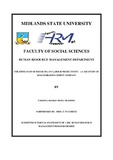Please use this identifier to cite or link to this item:
https://cris.library.msu.ac.zw//handle/11408/4048| Title: | The effects of outsourcing on labour productivity : a case of Sino - Zimbabwe Cement company | Authors: | Moyp, Virginia Shorai | Keywords: | outsourcing labour productivity |
Issue Date: | 2018 | Source: | Midlands State University | Abstract: | The study investigated the effects of outsourcing on labour productivity at Sino Zimbabwe Cement Company. A sample of 6 participants from SZCC management and 3 managers from outsourced labour companies was selected using judgmental sampling technique. Quota sampling technique was used to select 23 non managerial participants from SZCC employees and 15 participants from outsourced labour. Outsourcing was done to reduce costs and to access technical skills. It reduced level of commitment for SZCC employees leading to low labour productivity. Outsourced labour showed higher level of labour productivity because their level of commitment was high because they wanted to secure their jobs. The study showed that the level of output for outsourced labour was high which led to higher labour productivity. Outsourcing led to reduction costs due to efficient utilisation of labour which translated to higher labour productivity. Innovation was only evident in outsourced catering services. Other outsourced labour and SZCC workers did not depict any innovative ideas which reduced their level of labour productivity. In terms of labour flexibility outsourcing gave SZCC the opportunity to hire labour when most needed which ensured efficient utilisation of labour leading to higher labour productivity. The study also found that turnover for outsourced labour was low which implied that its labour productivity was high. As for SZCC turnover was high which implied that its labour productivity was low. The research found that SZCC was not providing its workers with training opportunities which led to reduction in level of commitment leading to low level labour productivity. The study recommended that for outsourcing to enhance labour productivity it must ensure job security, remuneration for subcontracted workers must be competitive to promote high labour productivity and training and development must be undertaken to both client and subcontracted workers to enhance labour productivity. | URI: | http://hdl.handle.net/11408/4048 |
| Appears in Collections: | Bsc Human Resource Management Honours Degree |
Files in This Item:
| File | Description | Size | Format | |
|---|---|---|---|---|
| final dissertation.pdf | Full Text | 1.04 MB | Adobe PDF |  View/Open |
Page view(s)
444
checked on Feb 27, 2026
Download(s)
794
checked on Feb 27, 2026
Google ScholarTM
Check
Items in MSUIR are protected by copyright, with all rights reserved, unless otherwise indicated.



